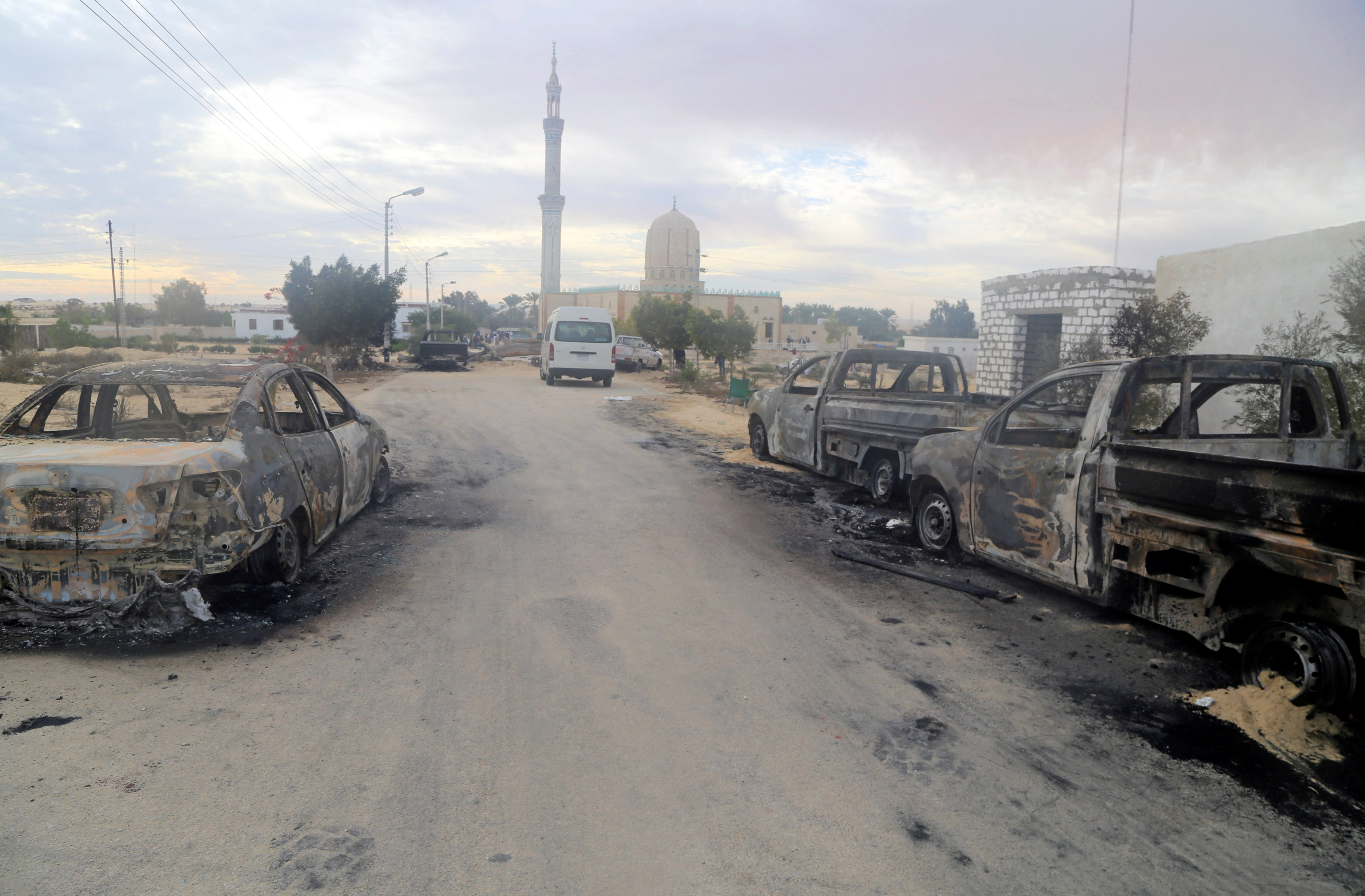 Damaged vehicles are seen after a bomb exploded at Al Rawdah mosque in Bir Al-Abed, Egypt November 25, 2017. REUTERS/Mohamed Soliman
Damaged vehicles are seen after a bomb exploded at Al Rawdah mosque in Bir Al-Abed, Egypt November 25, 2017. REUTERS/Mohamed Soliman US
Uri Friedman tries to understand what exactly is the danger in Trump’s foreign policy:
But if danger is crudely measured by how many people die in military conflicts as the result of a president’s policies, the dangers posed by Trump’s atypical behavior remain hypothetical at the moment. Leaving aside his genuinely unprecedented moves in trade and diplomacy, the wars that Trump is currently commanding were initiated by his predecessors. He has not (yet) started new conflicts with foes like Iran or North Korea or radically transformed existing ones. When it comes to the real use of military force, rather than the tweeted kind, Trump has acted rather like a “normal” U.S. president—only more so, as he’s escalated some conflicts he inherited. And yet it’s his abnormal actions, which so far haven’t killed anyone, that seem to scare his detractors most.
Gardiner Harris reports on the mass staff reductions at the State Department:
“Everyone who called me, I said: ‘Listen, guys, this is going to be great, and maybe he’ll finally get the department in shape,’” said Dana Shell Smith, the ambassador to Qatar, who recently resigned.
Since then, Ms. Smith has changed her mind.
“These people either do not believe the U.S. should be a world leader, or they’re utterly incompetent,” she said. “Either way, having so many vacancies in essential places is a disaster waiting to happen.”
Israel
Ben Caspit writes about how the IDF’s preparations for a ‘new Syria’:
Jerusalem has been voicing serious disappointment now that Trump is allowing Putin to do whatever he wants in the new Syria. The warm embrace between Putin and Assad in Sochi on Nov. 21, the statement by Russia’s foreign minister that an Iranian presence in Syria is legitimate, and the clear victory of the Shiite axis, which now stretches from the Persian Gulf to the Mediterranean Sea, are resulting in a chain of powerful responses from Tel Aviv and Jerusalem —Israel’s defense and political echelons.
Joshua Davidovich takes a look at the recent outrage about Tzipi Hotovely’s remarks on US Jews:
Tzipi Hotovely’s foot was already shoved in her mouth after she made the mistake of saying out loud what many Israelis think in their heart of hearts — that American Jews have “convenient lives” and don’t send their kids to fight in the military. On Friday morning she gets an assist from the press and outraged Jews in jamming her toes even further in there, though some try to stick their own feet in as well.
Middle East
Jason Burke hopes that the gruesome terror attack in Egypt will be a turning point in Egypt’s attitude toward terrorism:
One hope is that the deaths on Friday will not be in vain. An attack in 1997 in Luxor killed more than 60 foreign holidaymakers, crippled the tourist industry and appalled ordinary Egyptians. It swung public opinion squarely against the extremists, limiting recruitment and fundraising, while boosting support for an invigorated counter-terrorist campaign. It was a turning point. The campaign against the extremists in Egypt desperately needs another.
Ron Ben Yishai believes that Putin and Rouhani need Assad just as much as he needs them:
Seemingly, the Assad regime would collapse without Russian and Iranian support, which is why the Syrian president is allegedly completely dependent on them and they don’t have to consider his opinion on any issue whatsoever. Recently, however, Assad gained some trump cards. Russia, Iran and even Turkey need him to exploit the assets they have gained as a result of their military intervention in Syria. Assad is providing them with legal and international legitimization to remain in his country and to gain from economic projects related to its reconstruction. Assad is also allowing the Russians, the Iranians and the Turks to realize their strategic goals through their ongoing presence in Syria.
Jewish World
Alexander Beider explains why many Sephardic Jews are actually not Sephardic:
Yet, the less than twenty Sephardic-originated surnames in Eastern Europe represent a tiny group within my dictionary of Jewish surnames from the Russian Empire, which includes more than 70,000 surnames. And the cases where Sephardic origins are now obscured etymologically are hard to confirm, and likely small in numbers.
An honest look at the data suggests that very few Sephardic Jews ever made it to Eastern Europe.
David Mickis reviews Eddy Portnoy’s new book on Yiddish-era stories on crazy and ridiculous Jews:
What the world really needs is a study of dumb Jews, Peter Gay remarked while disparaging a book about how “the Jewish genius” had, so the author claimed, invented modernity. Eddy Portnoy in Bad Rabbi: And Other Strange But True Stories From the Yiddish Press has come along to answer Gay’s request. Bad Rabbi explores the sensational offerings of the Yiddish newspapers in both America and Eastern Europe, which featured, Portnoy says, “multitudes of mediocre Jews, many of whom lived on the verge of modernity, yet were often backward and stupid.”























 More news and opinions than at a Shabbat dinner, right in your inbox.
More news and opinions than at a Shabbat dinner, right in your inbox.